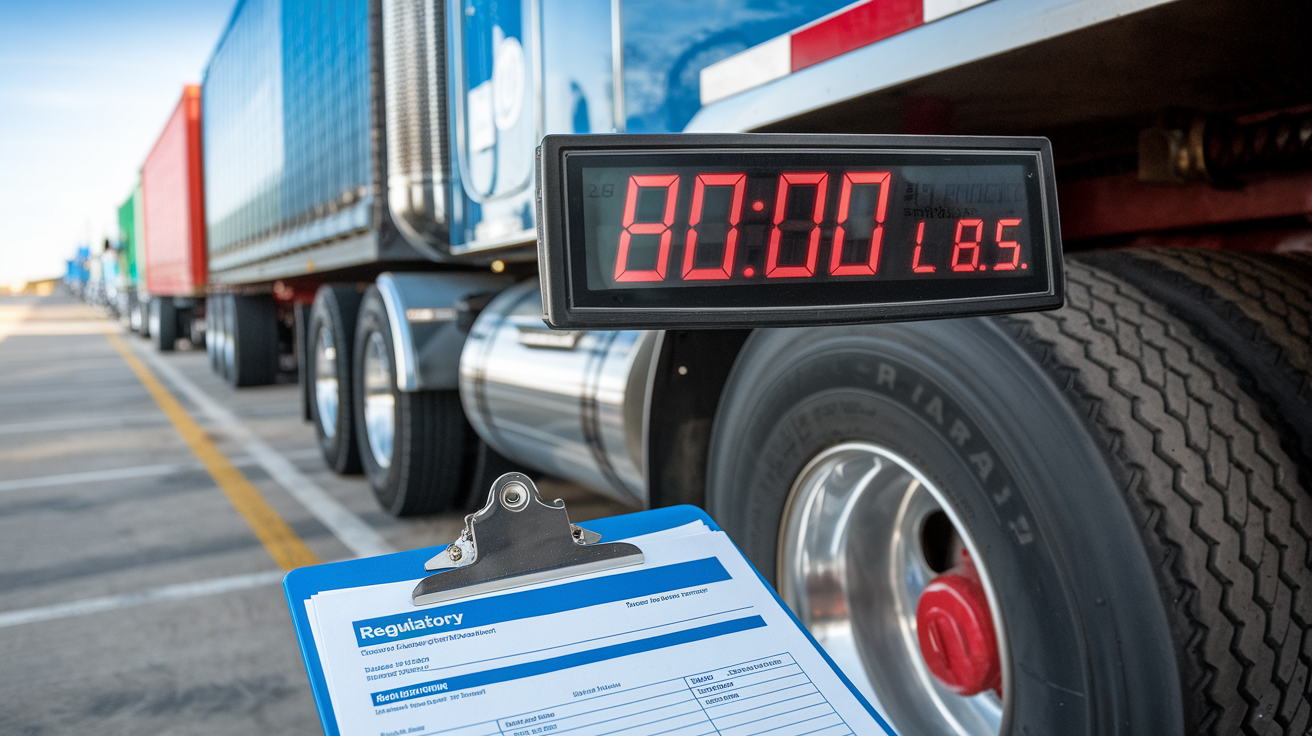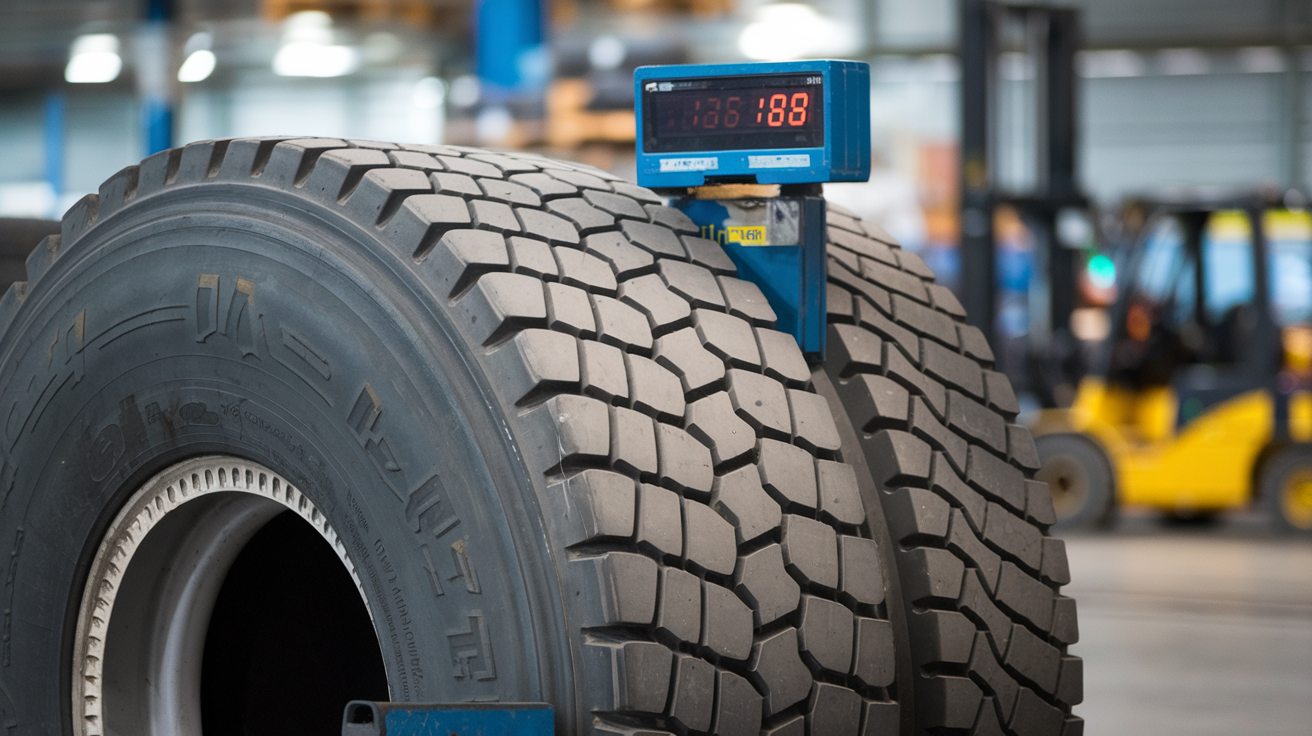How much does a semi truck tire weigh?
how much does a semi truck tire weigh? Have you ever stopped to consider the sheer magnitude of a semi truck’s tires? 🚛 These behemoths of the road rely on tires that are far from your average rubber wheels. In fact, the weight of a single semi truck tire might surprise you – it’s a crucial factor that impacts everything from fuel efficiency to road safety.
Imagine trying to change a tire that weighs as much as a grown adult! That’s the reality for many truck drivers and mechanics. But why does the weight of these tires matter so much? From the type of cargo a truck can haul to the wear and tear on our highways, the weight of semi-truck tires plays a pivotal role in the trucking industry. Whether you’re a curious bystander, a budding truck driver, or a fleet manager looking to optimize performance, understanding tire weight is essential.
In this comprehensive guide, we’ll roll through everything you need to know about semi truck tire weight. We’ll explore the different types of tires and their varying weights, delve into the components that contribute to their heft, and examine how tire weight affects truck performance. Buckle up as we navigate through regulations, weight limits, and even provide tips on choosing the right tire weight for your semi truck. Let’s hit the road and uncover the weighty truth about these titans of transportation!
Understanding Semi Truck Tire Weight

Average weight range for semi truck tires
Semi truck tires typically weigh between 100 to 150 pounds (45 to 68 kilograms) for a standard size. However, the weight can vary significantly based on several factors. Here’s a breakdown of average weights for different types of semi truck tires:
| Tire Type | Weight Range (lbs) | Weight Range (kg) |
|---|---|---|
| Steer | 110 – 120 | 50 – 54 |
| Drive | 120 – 130 | 54 – 59 |
| Trailer | 100 – 110 | 45 – 50 |
| Wide-base | 150 – 170 | 68 – 77 |
Factors affecting tire weight
Several factors contribute to the variation in semi truck tire weight:
- Tire size and dimensions
- Tread depth and pattern
- Construction type (radial vs. bias)
- Load capacity rating
- Intended use (long-haul, regional, or off-road)
Importance of knowing tire weight
Understanding semi truck tire weight is crucial for several reasons:
- Fuel efficiency: Heavier tires can reduce overall fuel economy
- Load capacity: Proper tire weight ensures optimal load-bearing capabilities
- Compliance: Adhering to weight regulations and axle load limits
- Safety: Correct tire weight distribution enhances vehicle stability and handling
- Maintenance: Helps in planning for tire rotations and replacements
Knowing the weight of your semi truck tires allows for better overall fleet management and can lead to significant cost savings in the long run. Now that we’ve covered the basics of semi truck tire weight, let’s explore the different types of tires and their specific weights in more detail.
Types of Semi Truck Tires and Their Weights

Steer tires
Steer tires are the front tires of a semi truck, responsible for steering and bearing a significant portion of the vehicle’s weight. These tires typically weigh between 110 to 120 pounds (50 to 54 kg) each. Steer tires are designed to provide excellent traction and handling, ensuring precise control of the truck.
Drive tires
Drive tires are located on the rear axles of the tractor unit and are responsible for propelling the truck forward. These tires are generally heavier than steer tires, weighing approximately 120 to 130 pounds (54 to 59 kg) each. Drive tires often come in pairs or even sets of four per axle to distribute the weight and provide better traction.
Trailer tires
Trailer tires support the weight of the trailer and its cargo. These tires typically weigh between 100 to 110 pounds (45 to 50 kg) each. Trailer tires are designed to withstand heavy loads and long-distance travel, often featuring specialized tread patterns for improved stability and fuel efficiency.
Wide-base tires
Wide-base tires, also known as super singles, are increasingly popular in the trucking industry. These tires can weigh between 150 to 170 pounds (68 to 77 kg) each and are designed to replace dual tire setups. Wide-base tires offer several advantages, including:
- Reduced overall weight
- Improved fuel efficiency
- Increased payload capacity
Here’s a comparison of the different tire types and their average weights:
| Tire Type | Average Weight (lbs) | Average Weight (kg) |
|---|---|---|
| Steer | 110-120 | 50-54 |
| Drive | 120-130 | 54-59 |
| Trailer | 100-110 | 45-50 |
| Wide-base | 150-170 | 68-77 |
Understanding the weight of different semi truck tire types is crucial for proper load distribution, fuel efficiency, and compliance with regulations. Now that we’ve covered the various tire types and their weights, let’s explore the components that contribute to overall tire weight.
Components Contributing to Tire Weight

Tread rubber
The tread rubber is the most substantial component contributing to a semi truck tire’s weight. This thick layer of rubber is designed to withstand the immense pressure and wear from constant road contact. On average, the tread rubber accounts for about 30-40% of the tire’s total weight.
| Component | Percentage of Total Weight |
|---|---|
| Tread rubber | 30-40% |
| Steel belts and cords | 15-25% |
| Sidewalls | 20-30% |
| Bead area | 15-20% |
Steel belts and cords
Steel belts and cords form the tire’s skeleton, providing strength and stability. These components typically make up 15-25% of the tire’s weight. The steel reinforcement is crucial for:
- Maintaining tire shape under heavy loads
- Enhancing puncture resistance
- Improving tread life
Sidewalls
Sidewalls contribute significantly to a semi truck tire’s weight, accounting for approximately 20-30% of the total. They play vital roles in:
- Protecting the tire’s internal structure
- Providing flexibility for a smoother ride
- Displaying important tire information
Bead area
The bead area, while smaller, is dense and heavy, making up about 15-20% of the tire’s weight. This crucial component:
- Ensures a secure fit between the tire and wheel rim
- Prevents air leakage
- Handles the stress of mounting and dismounting
Understanding these components helps truckers and fleet managers make informed decisions about tire selection and maintenance, ultimately impacting fuel efficiency and overall vehicle performance.
Impact of Tire Weight on Truck Performance

Fuel efficiency
The weight of semi truck tires significantly impacts fuel efficiency. Heavier tires require more energy to rotate, leading to increased fuel consumption. Here’s a comparison of tire weight and its effect on fuel efficiency:
| Tire Weight | Fuel Efficiency Impact |
|---|---|
| Light | Higher efficiency |
| Medium | Moderate efficiency |
| Heavy | Lower efficiency |
To optimize fuel efficiency, many trucking companies opt for lighter tires when possible, balancing performance needs with fuel economy.
Payload capacity
Tire weight directly affects a semi truck’s payload capacity. Heavier tires reduce the available weight for cargo, while lighter tires allow for increased payload. Consider the following:
- Lighter tires can increase payload capacity by 200-400 pounds per axle
- This translates to potential additional revenue per trip
- However, lighter tires may have shorter lifespans or reduced durability
Handling and stability
The weight of semi truck tires plays a crucial role in vehicle handling and stability:
- Heavier tires provide better traction and stability, especially in adverse weather conditions
- Lighter tires offer improved maneuverability and responsiveness
- Balanced tire weight distribution enhances overall truck stability
Tire wear and longevity
Tire weight influences wear patterns and longevity:
- Heavier tires typically have thicker treads, potentially lasting longer
- Lighter tires may wear faster but offer better fuel efficiency
- Proper weight distribution across axles is crucial for even tire wear
Ultimately, choosing the right tire weight involves balancing performance factors with operational needs. Next, we’ll explore the regulations and weight limits that govern semi truck tire selection.
Regulations and Weight Limits

Federal weight restrictions
Federal regulations play a crucial role in determining the weight limits for semi-truck tires. The U.S. Department of Transportation (DOT) sets these guidelines to ensure road safety and minimize infrastructure damage. Here’s a breakdown of the key federal weight restrictions:
| Axle Type | Maximum Weight Limit |
|---|---|
| Single Axle | 20,000 lbs |
| Tandem Axle | 34,000 lbs |
| Gross Vehicle Weight | 80,000 lbs |
These limits directly impact tire selection, as the weight must be distributed evenly across all tires. Tires must be capable of supporting their share of the total weight while maintaining safety standards.
State-specific regulations
While federal regulations provide a baseline, individual states may impose additional or more stringent weight restrictions:
- Bridge laws: Some states have specific weight limits for bridges
- Seasonal restrictions: Weight limits may be reduced during spring thaw periods
- Special routes: Certain roads may have lower weight limits due to infrastructure concerns
Truckers must be aware of these state-specific regulations to avoid penalties and ensure compliance across different jurisdictions.
Consequences of overweight tires
Exceeding weight limits for semi-truck tires can lead to severe consequences:
- Safety hazards: Increased risk of blowouts and accidents
- Legal penalties: Fines, license suspension, and potential lawsuits
- Increased wear: Accelerated tire degradation and reduced lifespan
- Fuel inefficiency: Overweight tires lead to higher fuel consumption
- Environmental impact: Increased emissions due to reduced fuel efficiency
To avoid these issues, it’s crucial for trucking companies and drivers to carefully monitor tire weights and adhere to both federal and state regulations.
Choosing the Right Tire Weight for Your Semi Truck

Assessing your trucking needs
When choosing the right tire weight for your semi truck, it’s crucial to start by assessing your specific trucking needs. Consider the following factors:
- Type of cargo
- Typical routes and terrain
- Climate conditions
- Fuel efficiency goals
- Load capacity requirements
Here’s a table summarizing how these factors influence tire weight selection:
| Factor | Light Tires | Heavy Tires |
|---|---|---|
| Cargo | Less dense, smaller loads | Dense, heavy loads |
| Terrain | Smooth highways | Rough roads, off-road |
| Climate | Mild conditions | Extreme temperatures |
| Fuel Efficiency | Higher priority | Lower priority |
| Load Capacity | Lower | Higher |
Balancing weight and performance
Finding the right balance between tire weight and performance is essential for optimal semi truck operation. Consider these key points:
- Lighter tires can improve fuel efficiency and reduce overall vehicle weight
- Heavier tires often provide better traction and durability
- Tire weight affects braking distance and handling
- Proper weight distribution among axles is crucial for stability
Consulting with tire professionals
To make the best decision for your semi truck, it’s advisable to consult with tire professionals. They can provide:
- Expert advice based on your specific needs
- Up-to-date information on tire technology
- Recommendations for tire maintenance and rotation schedules
- Insights into regulatory compliance and weight limits
Remember, choosing the right tire weight is a critical decision that impacts your truck’s performance, safety, and operating costs. Now that you understand the factors to consider, let’s explore the importance of proper maintenance and weight management for your semi truck tires.
Maintenance and Weight Management

Regular weighing and inspections
Regular weighing and inspections are crucial for maintaining optimal semi truck tire performance and safety. Here’s a breakdown of the key aspects:
- Frequency: Conduct weighing and inspections at least once a month
- Visual checks: Look for signs of wear, damage, or uneven tread patterns
- Pressure checks: Ensure proper inflation levels for each tire
- Weight distribution: Verify even weight distribution across all axles
| Inspection Type | Frequency | Benefits |
|---|---|---|
| Visual | Weekly | Early detection of damage |
| Pressure | Bi-weekly | Improved fuel efficiency |
| Weighing | Monthly | Optimal weight distribution |
| Tread depth | Monthly | Enhanced safety and longevity |
Proper inflation techniques
Maintaining proper tire inflation is essential for maximizing tire life and truck performance. Follow these steps:
- Use an accurate tire pressure gauge
- Check tire pressure when tires are cold
- Inflate to the manufacturer’s recommended PSI
- Adjust pressure based on load and road conditions
- Document inflation levels for each tire
Rotation schedules for even wear
Implementing a regular rotation schedule helps ensure even wear across all tires, extending their lifespan and improving overall truck performance. Consider the following:
- Rotate tires every 50,000 to 75,000 miles
- Follow manufacturer-recommended rotation patterns
- Inspect tires during rotation for any signs of unusual wear
- Adjust alignment if uneven wear is detected
By adhering to these maintenance practices, you can effectively manage tire weight, extend tire life, and optimize your semi truck’s performance. Regular attention to these details will not only improve safety but also contribute to better fuel efficiency and reduced operational costs.

Semi truck tire weight is a crucial factor that impacts various aspects of trucking operations. From steering tires weighing around 120 pounds to drive tires reaching up to 130 pounds, the weight of these tires plays a significant role in fuel efficiency, load capacity, and overall performance. Understanding the different types of tires, their components, and how they contribute to the total weight is essential for truck owners and operators.
Choosing the right tire weight for your semi truck requires careful consideration of factors such as route conditions, load requirements, and fuel efficiency goals. Regular maintenance and proper weight management are key to maximizing tire lifespan and ensuring optimal performance. By staying informed about regulations and weight limits, truckers can make informed decisions that benefit both their operations and road safety.
Looking to purchase truck tires in bulk? Reach out to us today, and our team will connect you with a reputable wholesale supplier in Thailand. We ensure access to high-quality products, competitive pricing, and a dependable supply chain tailored to meet your large-scale procurement needs.







